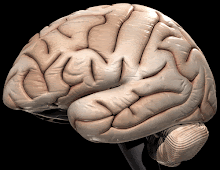Scientists have found that the brain is plastic - meaning, the brain can rewire itself. This has proved beneficial to the handicapped. For example blind people can learn to process touch signals from their fingertips using brain regions normally devoted to vision.
Researchers have demonstrated the process of brain rewiring using a technique called transcranial magnetic stimulation in which they apply a magnetic field to the skull and induce electric currents on the brain. They found that the visual cortex ( the part of the brain which handles signals from the eye) of a blind person's brain does not remain idle - other senses use it. In a typical experiment they asked ten blind and five sighted volunteers to identify Braille letters or raised Roman letters by touch. As they did so, the researchers used magnetic pulses to disrupt various regions of their brains. When they gave pulses to the visual cortex at the back of the head, the blind subjects felt extra dots or had trouble making out the Roman letters. The same stimulation had no effect on sighted readers. The researchers believe that blind people almost certainly use the visual cortex for hearing, tast and smell as well.
It is believed that this applies to persons having other types of impairment.
Researchers have demonstrated the process of brain rewiring using a technique called transcranial magnetic stimulation in which they apply a magnetic field to the skull and induce electric currents on the brain. They found that the visual cortex ( the part of the brain which handles signals from the eye) of a blind person's brain does not remain idle - other senses use it. In a typical experiment they asked ten blind and five sighted volunteers to identify Braille letters or raised Roman letters by touch. As they did so, the researchers used magnetic pulses to disrupt various regions of their brains. When they gave pulses to the visual cortex at the back of the head, the blind subjects felt extra dots or had trouble making out the Roman letters. The same stimulation had no effect on sighted readers. The researchers believe that blind people almost certainly use the visual cortex for hearing, tast and smell as well.
It is believed that this applies to persons having other types of impairment.
